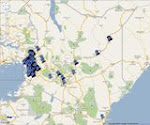Results of ecosan vision workshop in Nairobi
To facilitate a vision exercise possibly a team building process that can lead to the establishment of ESF Kenya
Participants attended:
Participants of the workshops were from water companies, water board, beneficiaries of some existing ecosan projects, NGOs working in grass root level.
PRESENTATIONS:
Experiences from Ecosan Promotion Project (EPP), download here
Experiences from Red cross:
Experiences from ROSA
Discussion - Conclusions for future development of ecosan:
•Allocation of funds for IEC(esp. awareness raising).
•Need to coordinate Kenyan ecosan activities.
•WSTF yet not impressed ecosan (pre-requisite for funding is existing sewer system).
•Major challenge in informal settlements (e.g. slums): town, water and sanitation planning have to go hand-in-hand.
•The same things are done over and over again, there is no coordination and networking.
•Output has to be shared with Ministries and responsible policy makers.
•More funds has to be invested in awareness creation -we have to change the mind set to bring demand driven approach
•Decision makers and key stakeholders have to be involved through policies
•economic incentives (especially in urban areas) are missing (w.r.to reuse of urine).
•schools: O&M of sanitation systems is an issue.
•address cultural issues (e.g. use of urine, etc.).
•lack of space in urban areas.
•research required to proof safety and dissemination of results.
•break cultural block through education, awareness.
•community participation is needed.design: to be improved (especially UDDT).
1.Why?
2.Role?
3.Tasks?
4.Structure?
5.Partners?
6.Further Issues?
1.Yes; need for body to coordinate; information & knowledge sharing; harmonize policies in sanitation
2.Can coordinate and do capacity building for different stakeholders
3.knowledge & information management; capacity development; quality assurance
4.society of professional players
5.Donor organisations; NGOs (national, international); government of Kenya (Ministry of Water and Irrigation, Ministry of Home Affairs, Ministry of Public Health and Sanitation); Water and sanitation companies; Research institutes (KARI); Public Universities; Private sector.
1.Yes; Information is limited as far as ecosan is concerned
2.training; networking and education
3.empower existing organisations and undertake ecosan projects
4.NGOs and governmental organisationsSustainability; exit plans required.
Group 3:
1.Don’t know why
2.Coordination of all NGO wastewater and sanitation activities
3.Support private sector; sell ecosan concepts
4.After 4 years of gtz ecosan in Kenya no partners
5.Private sector have to be the key player; a private sector structure
6.If the government does not support ecosan there is no sustainability.
Group 4:
1.Yes; bring all actors together; act as knowledge bank and link to other “banks” in the world;
2.Promote capacity building; resource mobilisation; IEC; offer sustainable affordable and sustainable sanitation
3.Promote capacity building; resource mobilisation; IEC; offer sustainable affordable and ecological sanitation
4.NGO structure
5.Other NGOs; donors; CBOs; government and institutions; contractors
6.Use existing structures & institutions; logistics/staffing.
Group 5:
1.Yes; promotion sustainable use of resources; promotion of environ. sustainability;
2.Promotion of renewable energy, reuse of human waste, ecosan concepts for creating awareness
3.Cap. development (trainings, …); Pilot projects; up-scaling; social marketing; lobbying & advocacy
4.Resource and training centre; board of trustees; CEOs,
5.NEMA; Universities; Ministry of Water and Irrigation (MWI); Ministry of Public Health and Sanitation (MPH&S), Ministry of Education (MOE), NGOs, private sector, financial inst., Ministry of Environment & Natural Resources (MOE&NR)
6.Revaluate what is there, identify the gaps and see what is needed.
Group 6:
1.Yes
2.There is no organisation promoting sanitation in cities,
3.Collection of information; sharing of best practices; monitoring and evaluation; research & development; influence policy formulation & implementation
4.network
5.NGOs; government; research inst.
6.Environmental sustainability; Ecosan has to be promoted where people do farming and have toilets.
 Mr. Patrick P. Onyango, GTZ Water Sector Reform Program, M. Wafler, 2010.
Mr. Patrick P. Onyango, GTZ Water Sector Reform Program, M. Wafler, 2010.
 Eng. P. L. Ombogo, Dir. Water Sector Reforms in MWI, M. Wafler, 2010.
Eng. P. L. Ombogo, Dir. Water Sector Reforms in MWI, M. Wafler, 2010.
 Mr. Johannes Heeb, seecon international gmbh, M. Wafler, 2010.
Mr. Johannes Heeb, seecon international gmbh, M. Wafler, 2010.
 Ms. Pradnya Thakur, Ecosan Services Foundation, M. Wafler, 2010.
Ms. Pradnya Thakur, Ecosan Services Foundation, M. Wafler, 2010.
 Participants interacting during tea break, M. Wafler, 2010.
Participants interacting during tea break, M. Wafler, 2010.
 Participants studying ecosan information material, M. Wafler, 2010.
Participants studying ecosan information material, M. Wafler, 2010. Presentation of findings on “Do we need an ESF-Kenya?”, M. Wafler, 2010.
Presentation of findings on “Do we need an ESF-Kenya?”, M. Wafler, 2010. Group photo, M. Wafler, 2010.
Group photo, M. Wafler, 2010.Observations and Conclusion:
•In Kenya sustainable sanitation is promoted as an isolation “stand alone” basis and was not seen as general practice.
•There are organisation mainly focussing on the water business and lesser emphasis on sanitation business activities.
•The existing networks are mainly of water companies.
•There is no organisation focusing only on ‘Ecosan’ or ‘Sustainable sanitation aspect’.
•An Alliance (a similar to SuSanA) should be established linking water and sanitation professionals as well as non-governmental institutions. Idea of bringing in different government initiatives in sustainable sanitation network will be worth trying.
•Professionally managed network of organizations and professionals with a permanent secretariat may be a key to success.
•The key objective of the network which the permanent secretrait to generate is “visibility of the initiatives” as well as to reach the critical mass, for up-scaling and mainstreaming sustainable sanitation in Kenya.
•None of the existing organisation is willing to take responsibility to mobilise the network. A very strong consensus emerged after the group works and discussions for need of ESF_Kenya, similar to that of ESF India as one stop-shop solution.


